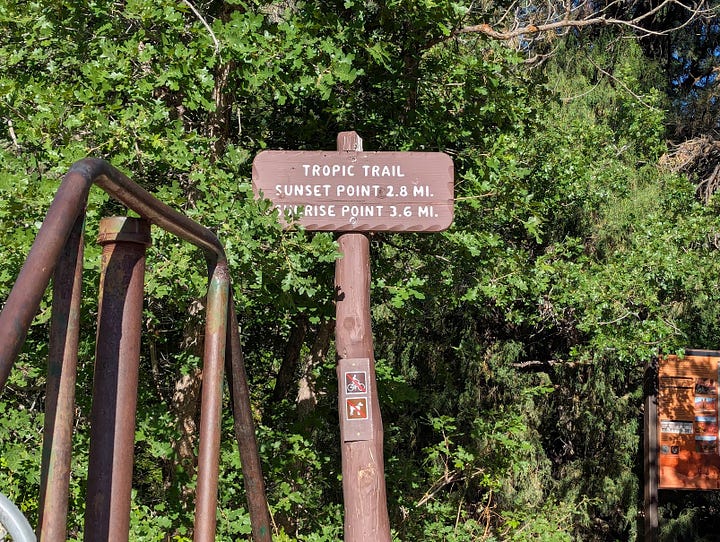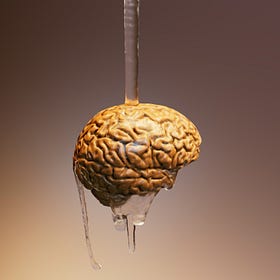I don't WANT my work to be easier
Another installment in the "I don't want AI, thanks very much" annals
A major selling point of AI is that it makes tasks “easier.” And sure, there are some tasks I’d like to be easier: I’d like it to be easier to wait in line at the DMV. (Free lattés?) I’d like it to be easier to do my taxes. (Though I’m no fan of the flat tax.) I’d like it to be easier for writers to make money.
But often, when you really think about whether you want something to be “easier,” you realize there’s a complexity there. I almost typed, “I’d like it be easier to give birth,” and that’s somewhat true. But frankly, although my first birthing experience was a slow-moving agony, my second one was a speed-birth, and I’ll tell you, that was much, much scarier!
The old saying “Be careful what you wish for” applies well to AI. Will we really be happier if AI makes our lives easier? Let’s investigate.
I don't WANT to work faster.
This piece was my first installment in my series on why I don't want AI. In this piece, I address creativity, the subject of The Babblery's June 2025 interview. Creativity often hits like lightning, but speed is not otherwise its friend.
Ease doesn’t lead to appreciation
Recently my husband and I hiked in Bryce Canyon. For our long hike, we chose to drive outside of the park and enter the canyon at its base. Few other people do this, because it’s really easy to get into the most beautiful part of the canyon from any one of the points served by the shuttle bus. But our hike started in a sparse forest full of delicate wildflowers. As we walked, fully alone, the canyon revealed itself slowly, orange hoodoos peeking out over the tops of trees. When the trail opened into the canyon floor, the reveal was all the more stunning because of the work it took to get there.
I think about the great naturalists of the Victorian age, whose work done over years can now be done in a day. Darwin had to sail to the Galapagos and back home on sail power; he used the time to study and ponder. When Alexander von Humboldt wanted to come to America, he was thwarted at every turn by European wars until he happened into Spain, which sent him on his way. Even then, the trip took five years and I can’t imagine what kinds of hardship. The list is unending: people facing difficulties use those difficulties to stimulate their work.
Ease doesn’t allow you to savor the details
In Yum!, a class I teach to kids about the history, science, and culture of what we eat, I set up polls every week. During the week when we study the science of food, my poll includes an option for students to say that they’d prefer just to take a pill rather than having to go through the process of eating. Not one student, even the pickiest eaters, has chosen that option. And the reason is obvious: Whether you’re a kid who will only eat white food or you’re a child gourmet who explores every eating opportunity, part of feeling satisfied is the process of eating itself.
My thoughts move again to travel, because our modern ability to step into a plane on one side of the earth and off on another has not necessarily given us anything more than speed. We miss seeing the slow change between ecosystems; we miss gaining intimate knowledge of places that planes lead us to consider “flyover country.” Some of my deepest travel experiences happened at points in between; if I’d been fixed only on the destination, I would have missed the pleasure of the voyage.
Ease devalues the experience
I have recently been working with my sister to catalog our family photos, taken during the last 125 years or so. These days, my family of two grandparents, five adult children with their five spouses, and eleven grandchildren generate who-knows-how-many gigabytes of photos ever year. But when we were kids, there was a camera, and film, and someone had to remember to bring the camera, to load the film, and to take the photos. I can scan the history of our family in reverse, starting with so many gigabytes I wouldn’t know where to start, ending with my mother’s grandmother in her bassinet, the only childhood photo of her that survives.
Which is more fulfilling? These days, I have put the task of cleaning out my photos on my calendar quarterly because I generate so many of them. If I attempted to do it once a year I’d just give up. But the thing is, when I’m scrolling through hundreds of digital snapshots, deciding which ones to trash, it’s nowhere near the experience of holding a print of my great-grandmother in my hand, knowing that someone took that photo on silver plate, developed it in a darkroom, and handed it to her parents, who so treasured it that I have it in my house today. The difficulty of that process added value to the experience.


Ease flattens the achievement curve
I am not a visual artist and I am in awe of their work. Right now I’m working with an artist to create the cover of my forthcoming children’s book. It was so fascinating to see what she did with the words I gave her (and a few photos for guidance). She sends me updates every time she makes a change, and I am seeing the details of her work, step by step.
Let’s face it: I could have gotten something pretty decent from typing a description into an AI image generator. Since there are no people in the image, at least I know they wouldn’t have been missing fingers! And the AI might actually have created something closer to what I was seeing in my mind’s eye. But would it have been more valuable to me? No!
My artist, Cara Bevan, has trained and worked to get to the place she is now. Her work is so human and so warm. I love knowing that there is a person whose hand held the brush. The work she’ll create will be precious not because it’s better than something an AI tool could make (though it will be!); it’s precious because of the achievement of the human behind it.
Anyone is better than AI
These days, anyone can be an artist. Anyone can be a writer. Anyone can be a stock analyst. But I fear that this ease of achievement is obscuring from most people the ability to discern real talent. It’s also devaluing the work that goes into achieving a high level in these pursuits, and I am very sure that it’s discouraging young people from working hard enough to achieve. Why would a young person who loves art in children’s books grow up to become an illustrator when the newest children’s book they got was created with AI? Why would a child want to work their brain as hard as the quants in New York do, knowing that they can just ask Google and get the answer they want? And why, oh why, would any child do what I’ve done this morning: sit their butt down in a chair, grind out words that are imperfect and incomplete, try to improve those words, and then, when they realize they are probably at their peak, hit SEND?
I hope that children still want to do these things, especially write, because I make my living teaching them how to do that. I hope that as the use of AI grows, its value tanks to the point where people don’t give any value to creative work made with AI. I hope that as the use of AI grows, people value their own hard work more. Our work is human. Our work is meaningful. And we should all hope that our work will never be easy.
I WANT my work to be difficult. How about you?
The Babblery can use your support. Please comment on, like, and share this post. Recommend our publication to your friends. Become a paid subscriber. Buy us a coffee. Buy Wally and Tabitha some cat food. Listen to KSQD. Be awesome and carry on.
If you enjoy podcasts, please subscribe to the Babblery on your favorite podcast platform, including Spotify, Amazon, TuneIn, Apple Podcasts, and YouTube.








I still print pictures and put them in albums. This means curation. AI could never know which images will have meaning when we look at the photos we've taken. AI can't judge what we'll want to remember, like the flat tire on the rental last year. We had to email the photo to the rental company, but we printed it because that's a story, not to be forgotten. AI can never be human. Work hard, play hard while you work (love what you do), and stay human in all your thinking. Also, happy sales to you on your book.
Thanks for writing what has been on my mind! We watched John Oliver’s take on AI a few days ago— frightening! Keep writing… we love your work!